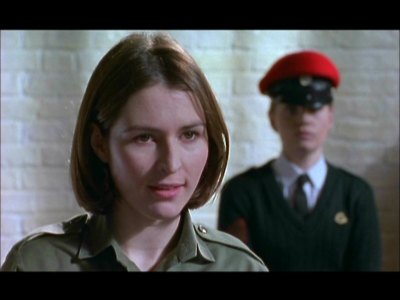| Reviews & Columns |
|
Reviews DVD TV on DVD Blu-ray 4K UHD International DVDs In Theaters Reviews by Studio Video Games Features Collector Series DVDs Easter Egg Database Interviews DVD Talk Radio Feature Articles Columns Anime Talk DVD Savant Horror DVDs The M.O.D. Squad Art House HD Talk Silent DVD
|
DVD Talk Forum |
|
|
| Resources |
|
DVD Price Search Customer Service #'s RCE Info Links |
|
Columns
|
|
|
Investigator, The
A fairly compelling British TV movie from 1997, The Investigator tells the true story of Caroline Meagher, a staff sergeant with the Royal Military Police, who made a career out of rooting out lesbians from the army, while secretly living her own lesbian lifestyle. Starring Helen Baxendale (Friends, Cold Feet) as Meagher, The Investigator brings up some potentially interesting questions about so-called "military justice" and the ingrained prejudices against gays in the military, but fails to capitalize - or comment sufficiently - on some of the more troubling aspects of Meagher's actions.

The Investigator starts with Meagher's arrest in 1989, when she comes under investigation for suspicion of being a lesbian - a court marshal offense in the British armed services. The film then reverts to flashbacks of Meagher's career, interwoven with the current interrogation of Meagher's activities. Meagher, a dedicated, loyal, patriotic soldier, jumps at the chance to join the SID (Special Investigative Branch) of the RMP. Working plainclothes, she's given various assignments, including following up on battered wives of British soldiers. When an opportunity to investigate and root out suspected lesbian activities comes up, Meagher eagerly agrees, sensing an important step in her career with the RMP. The military, claiming that there may be harassment and bullying associated with this "ring of lesbians," wants any kind of information on the suspected personnel that they can get their hands on, including rumors and innuendos from other soldiers, as well as copious notes and cross-checks of personal letters, phone calls, and private photographs. Clearly, the British military had a rather one-sided approach to investigating sexual harassment (as Meagher rightly asserts when told about these supposedly "dangerous" lesbians).
Meagher performs her job well, but is disturbed by some of the male investigators' tactics, which seem to go beyond the parameters of their proscribed duties, including bullying suspects to get salacious details about their lesbian affairs. But still, despite her misgivings, she continues to work for the SID, becoming quite adept at playing the "good cop" to frightened suspects, in concert with the rude, insensitive male "bad cops." However, when the stress of her job becomes too much, she goes to seek comfort from Staff Sergeant Chrissie Edgeworth (Katrina Levon), a senior officer who has made knowing, seductive passes at Meagher before, including one blatant attempt in the shower - a pass that Meagher didn't report, nor outright reject. Meagher and Edgeworth become lovers that night, and suddenly Meagher's job becomes infinitely more complicated as she realizes that she is a lesbian, working for the military to root out lesbians. Under the advice of Edgeworth, who has nothing but contempt for the silly girls who are dumb enough to get caught in their illegal romances, instructs Meagher on how to be ever cautious about leaving any kind of evidence that could potentially be used against her.
Meagher continues advancing in her career, while leaving behind Edgeworth. A side relationship with a male investigative partner proves unworkable because Meagher finally, fully admits (after seeing Edgeworth again) that she's a lesbian, and that she can't pretend to be in a heterosexual relationship. Beginning a love affair with Louisa (Laura Fraser), a Scottish school teacher, Meagher is blissfully happy. However, Meagher agrees again to help an investigation where a high-ranking female officer in an isolated Scottish army base is suspected of bullying junior officers into having sex, and showing favoritism to those who acquiesce. The officer slips out of trouble, but Meagher is again torn by her duties; she subtly tries to help those soldiers that are suspected of lesbianism, but she's unable to do anything of substance to stop their investigations.
Stationed now in Northern Ireland, Meagher has Louisa visit often, but she doesn't count on a jealous (jealous for reasons the movie never really spells out) roommate, Kathy (Tracy Keating), ratting her out to the authorities, particularly when Meagher gets close romantically to another senior officer, Major Fiona Lang (Zara Turner). Now under investigation herself, Meagher must play the role of suspect to two tough male interrogators, just as she herself watched other women fall under the crushing weight of so-called military justice.
The Investigator does bring to light the ingrained prejudices towards homosexuals that exist in the military. As Meagher rightly says at one point in the story, if her actions had been with a man, she wouldn't have been under investigation. And it is unfair that infractions against military law aren't prosecuted equally among all soldiers and officers, regardless of their sexual orientation. True, the soldiers who did live secret lives were breaking military rules, and as such, didn't have much right to complain when they were caught (the genetics of military culture don't recognize the rights of the individual to break military law, regardless of the right or wrong of an individual's feelings). And while it is true that everyone who signed up for the British military was well aware that engaging in homosexual activity was a court marshal offense, the tactics of the male investigators, according to this movie, were reprehensible. It's not a question that the female soldiers were breaking military law; they were. What was questionable - and appalling -- was the cruel, denigrating treatment by the military of these suspects, with the sexual peccadilloes of the male investigators seemingly more important than the fair, equitable treatment of the female soldiers. In The Investigator, the question of whether or not gays should be in the military is really beside the point - or at least should be, considering the facts of the story. Because so much more could have been explored in the film, relevant to Meagher's and other characters' actions.
Of particular interest to me was the character of Staff Sergeant Edgeworth. Confident in her seduction of Meagher, yet professional and focused on her abilities to compartmentalize and hide her lesbian activities, the character of Edgeworth comes off as the most layered, and most complex. Levon's few brief scenes as Edgeworth are particularly good; she comes off as a confident seducer (as a senior officer, and thus, susceptible to charges of harassment, this tangent is left alone, as well, in the film), and a shrewd survivor of the military culture that she's learned to navigate. She's unashamed of her sexual orientation, and yet, she seems to enjoy putting one over on the dense military that is unaware of her actions. I found myself wanting to know more about her character than Meagher - and that's bad for The Investigator, because it's not really her story.
The Investigator doesn't want to look too closely at Meagher's actions, because I suspect there would be a lot of muddied waters if the producers had. Meagher participated in those earlier interrogations. Her actions caused quite a few good soldiers, who did nothing more than live their private lives according to their own beliefs, to be kicked out of the military. And yet she was gay herself; she was, in a word, a hypocrite. However, the film doesn't really address Meagher's complicity in the very process that eventually grinds her up. Despite showing Meagher upset during these early interrogations, it's hard to feel genuine sympathy for her during her own interviews when you realize what she herself had done this to others, and had by her own admission, enjoyed most of her investigative work. At the end of The Investigator, there's a three minute clip with the real Caroline Meagher, discussing what happened to her and to others in the military who were found out to be homosexuals. It's a compelling moment, but I would have also liked to hear a sound bite or two from some of the women she helped root out, actions which advanced her career - while all the time she was living the exact same kind of private life those other women were living. It's a pretty big area of moral quicksand that the film unfortunately chooses not to address.

The DVD:
The Video:
The widescreen, 1.78:1 video image for The Investigator is quite nice, with muted colors appropriate to the downbeat story, and a sharp, clear transfer.
The Audio:
The Dolby Digital English 2.0 stereo mix is adequate for this kind of dialogue-driven production. There are no subtitles or close-captioning options available.
The Extras:
There are brief text filmographies for a few of the cast members of The Investigator.
Final Thoughts:
The Investigator tells a compelling true story of prejudice towards gays in the British military. It's competently done, with some good performances to keep your attention. But there are a lot of unanswered questions about the complicity of the main character in the film, and it ultimately becomes a fairly interesting, if one-note account of a shameful episode in British military history, rather than the morally complex, layered film that's lurking in there somewhere. Unless you're deeply engaged by the subject matter, I suggest you rent The Investigator.
Paul Mavis is an internationally published film and television historian, a member of the Online Film Critics Society, and the author of The Espionage Filmography.


|
| Popular Reviews |
| Sponsored Links |
|
|
| Sponsored Links |
|
|
| Release List | Reviews | Shop | Newsletter | Forum | DVD Giveaways | Blu-Ray | Advertise |
|
Copyright 2024 DVDTalk.com All Rights Reserved. Legal Info, Privacy Policy, Terms of Use,
Manage Preferences,
Your Privacy Choices | |||||||














